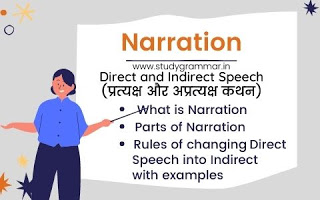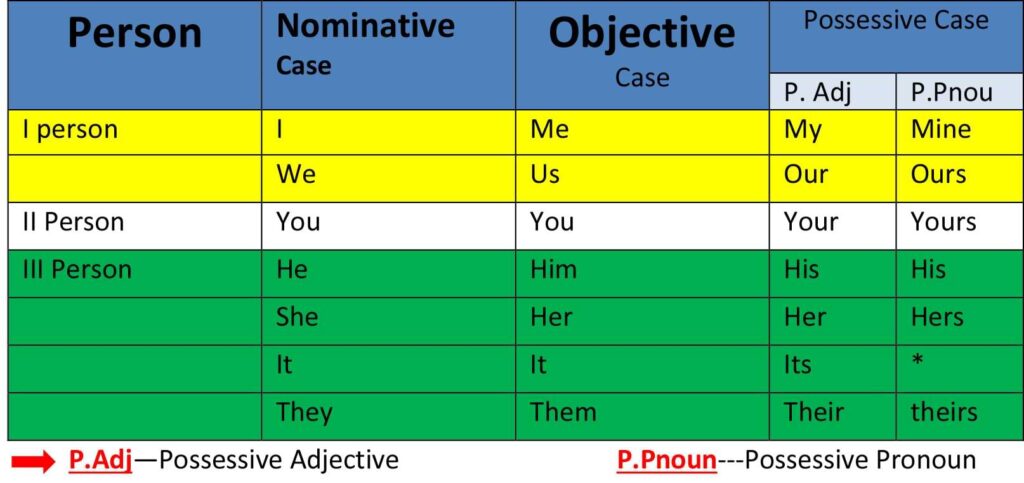तो दोस्तों आज हम एक ऐसे विषय पर चर्चा करेंगे जो कुछ छात्रों को थोडा कठिन लगता है जो है Reported Speech (Direct-Indirect Narrations) in Hindi . हम आपको Narration with Rules and Examples के साथ बताएँगे। जिससे आपको Narration in Hindi आसानी से समझ आ सके।

Table of Contents
Direct and Indirect Speech Rules, Example in Hindi
तो सबसे पहले जानते है Narration Meaning in Hindi -Narration का शाब्दिक अर्थ होता है -‘ कथन ‘। Narration शब्द की उत्पत्ति अंग्रेजी भाषा के शब्द Narrate से हुई है ,जिसका शाब्दिक अर्थ होता है -कहना (to say / to state )।
हम किसी के द्वारा कही गयी बातों को किसी से दो तरह से बता सकते हैं- एक को Direct Speech(प्रत्यक्ष कथन ) कहते हैं तथा दूसरे को Indirect Speech (अप्रत्यक्ष कथन )। आइये अब जानते हैं कि Direct and Indirect Speech (प्रत्यक्ष और अप्रत्यक्ष कथन ) क्या होता है ।
- Direct Speech /Direct Narration (प्रत्यक्ष कथन) :-
जब वक्ता द्वारा कही गयी बात को ज्यों का त्यों (हू -ब-हू) किसी को व्यक्त करते हैं ,तो उसे Direct Narration कहा जाता है। Direct Narration को Inverted Commas में बंद किया जाता है। जैसे-She said to me,”I am going to Jaipur”.
Sachin said to Lavi,”I shall go to college tomorrow”. - Indirect Speech / Indirect Narration(अप्रत्यक्ष कथन):-
जब हम वक्ता द्वारा कहे गये कथन को अपने शब्दों में व्यक्त करते हैं तो उसे Indirect Narration कहते हैं। जैसे -He said that he was going to college.ध्यान रखें -Indirect Narration में वक्ता के कथन का अर्थ नही बदलता है केवल कथन का तरीका बदल जाता है
Parts of Narration in Hindi with Examples-
Narration में Direct Speech के दो भाग होते हैं-
1.Reporting Speech
2.Reported Speech .
Reporting Speech क्या है ?
Direct Speech का वह भाग जो Inverted Commas(“….”) के बाहर होता है उसे Reporting Speech कहते हैं। जैसे –
Ragini said to me,”I am going to Jaipur”. इस वाक्य में ‘She said to me‘ Reporting Speech है।
Reporting Speech के भाग | Parts of Reporting Speech
Reporter:- वक्ता अर्थात कथन कहने वाले को Reporter कहा जाता है ,उपरोक्त वाक्य में Ragini को Reporter कहा जाएगा।
Reporting Verb:- वक्ता द्वारा जिस Verb का प्रयोग किया जाता है उसे Reporting Verb कहते हैं। उपरोक्त वाक्य में Reporting Verb ‘said’ है।
Reporting Object:- वक्ता कथन जिससे कह रहा है ,उस object को Reporting Object कहते हैं, उपरोक्त वाक्य में Reporting Object ‘me’ है।
Reported Speech क्या है ?
Direct Speech का वह भाग जो Inverted Commas(”….’) के अन्दर होता है , उसे Reported Speech कहा जाता है।
जैसे –Sachin said to Lavi,”I shall go to college tomorrow“. इस वाक्य में inverted commas(“…”) के अन्दर के वाक्य “I shall go to college” Reported Speech है।
Reported Speech के भाग | Parts of Reported Speech
Verb of Reported Speech:- Reporting Speech (Inverted commas के अन्दर के वाक्य ) की verb को Verb of Reported Speech कहा जाता है ,उपरोक्त वाक्य में ‘shall go‘ Reported Speech की Verb है।
Rules of Changing Direct Speech into Indirect Speech in Hindi-
आइये अब जानते हैं की DIrect Narration को Indirect Narration में बदलने के नियम । Direct Speech को Indirect Speech में परिवर्तन के नियमों को दो भागों में विभाजित किया जा सकता है –
- General Rules(सामान्य नियम ):- वो नियम जो सभी प्रकार के वाक्यों पर साधारणतया लागू होते हैं।
- Specific Rules(विशेष नियम ):- वो नियम जो अलग अलग प्रकार के वाक्यों के लिए अलग -अलग हैं।
DIrect Speech को Indirect में बदलने के General Rules-
Rule-1 Direct Speech से Indirect Speech में परिवर्तन होने पर Inverted Commas हटा दिए जाते हैं।
Rule-2 उसके बाद Reporting Verb का Tense देखें –
यदि Direct Narration में Reporting Verb, Present या Future tense में है तो Indirect में परिवर्तन करते समय Reported Speech के tense में कोई परिवर्तन नही किया जाता है।
Reporting Verb के Past, में होने की स्थिति में निम्नलिखित प्रकार से Tense में परिवर्तन किया जाता है –
| Direct Narration | Indirect Narration |
|---|---|
| Present Indefinite | Past Indefinite |
| Present Continuous | Past Continuous |
| Present Perfect | Past Perfect |
| Present Perfect Continuous | Past Perfect Continuous |
| Past Indefinite | Past Perfect |
| Past Continuous | Past Perfect Continuous |
| Past Perfect | No change of Tense |
| Past Perfect Continuous | No change of Tense |
Rules for Change in Future Sentences (Reported Speech)
| Direct Narration | Indirect Narration |
|---|---|
| Will/shall | Would/should |
| Can | Could |
| May | Might |
| Could/should/would/might | No change |
Rule-3. Indirect Speech में परिवर्तन होने पर Reported Speech के Persons का परिवर्तन निम्न प्रकार से होता है –
First Person:- Reporting verb के subject के अनुसार बदलता है।
Second Person:- Reporting verb के object के अनुसार बदलता है।
Third Person:- इसमें कोई परिवर्तन नही होता है।
Person:-का परिवर्तन करते समय यह ध्यान रखें की यदि person बहुवचन है तो परिवर्तन बहुवचन के अनुसार होगा। यदि Person ,Possessive case में है तो परिवर्तन उसी के अनुसार होगा। Person का परिवर्तन Direct से Indirect में परिवर्तन का एक महत्वपूर्ण भाग है ,ध्यान रखें कि Person का number एवं case नही बदला जाता है।
Pronouns का परिवर्तन निम्न table के अनुसार होता है।
Forms of Personal Pronouns:-

Rule-4.यदि Reporting Verb say,says,will say या said रहे तो Indirect Speech में भी say,says,will say या said ही रहेगी ,लेकिन यदि Reporting verb के साथ ‘to’ लगा हो तो परिवर्तन निम्न प्रकार से होता है –
say to—-tell
says to—tells
said to—told
Note:- tells या told के बाद object आना आवश्यक है। जैसे- He tells,"Ram is playing."(Incorrect) He told,"I am going"(Incorrect) He told that he was going.(Incorrect) उपरोक्त वाक्य गलत हैं ,क्योंकि यहाँ Tells/told के साथ कोई object नही है। यहाँ tells की जगह says एवं told की जगह said का प्रयोग किया जाना चाहिए था।
Rule-5 Indirect Speech में बदलने पर पर Reporting Verb के बाद सामान्य वाक्यों में that का प्रयोग किया जाता है।
उक्त नियमों को ध्यान में रखते हुए निम्न वाक्यों का Direct से Indirect में परिवर्तन पर ध्यान दें –
Direct:-He says,”I am going to Jaipur.”
Indirect:-He says that he is going to Jaipur.
- Direct से Indirect बनाते समय सबसे पहले देखें की Reporting verb का Tense क्या है। यह Present tense है। अतः Reporting Speech के tense में कोई परिवर्तन नही होगा।
- Reporting verb ,says है। अतः Indirect में भी says ही रहेगी।
- Reported Speech में ,I First Person pronoun है जो की Subject(he) के अनुसार बदलकर I का He हो जाएगा और am,verb बदलकर is हो जायेगी।
Direct:- She says to me,”You are writing a letter to him.”
Indirect:-She tells me that I am writing a letter to him.
- उपरोक्त वाक्य में Reporting Verb ,says to बदलकर tells हो जायेगी।
- Reported Speech में you एवं him ,II एवं III person pronouns हैं। II person pronoun(you)-object के अनुसार बदलता है। अतः object’me ‘ के अनुसार I हो जाएगा ,III person pronoun–him में कोई परिवर्तन नहीं होगा।
Rule-7 जब Reporting Verb,Past Tense में हैं तो Reported Speech में आये कुछ शब्दों में परिवर्तन होता है ,जैसे –
| Direct Narration | Indirect Narration |
|---|---|
| This | That |
| These | Those |
| Here | There |
| Hence | Thence |
| Hither | Thither |
| Now | Then |
| Ago | Before |
| Thus | So |
| Today | That day |
| Tomorrow | The next day /the following day |
| Yesterday | The previous day |
| Last week/month/year | The previous week/month/year |
| The last fortnight | The previous fortnight |
| The day before yesterday | The day before previous day |
Tensewise Solved Examples of Direct-Indirect Narration
Present Indifinite:-
Direct-He said to me,”I never eat sweets.”
Indirect-He told me that he never ate sweets.
Present Continuous:-
Direct-Ram said to Shyam,”I am watching T.V.”
Indirect-Ram told Shyam that he was watching T.V.
Present Perfect:-
Direct-Sita said,”I have already cooked.”
Indirect-Sita said that she had already cooked.
Present Perfect Continuous:-
Direct– Sonu said to me,”I have been reading for an hour”
Indirect-Sonu told me that he had been reading for an hour.
Past Indefinite;-
Direct-She said to Ram,”I went to Jaipur last week.”
Indirect-She told Ram that she had gone to Jaipur the previous week
Past Continuous:-
Direct-She said to me,”I was waiting for you.”
Indirect-She told me that she had been waiting for me.
Past Perfect:-
Direct-He said to me,”I had completed my project.”
Indirect-He told me that he had completed his project.
Past Perfect Continuous:-
Direct-He said,”I had been playing chess for two hours”
Indirect-He said that he had been playing chess for two hours.
Future Indefinite:-
Direct-Ram said to Meena,”I shall write a letter.”
Indirect-Ram told Meena that he would write a letter.
Future Continuous:-
Direct-Rahim said to Ram,”Sita will be waiting for you.”
Indirect-Rahim told Ram that Sita would be waiting for him.
Future Perfect:-
Direct-Sita said to Ram,”I will have completed my work.”
Indirect-Sita told Ram that she would have completed her work.
Future Perfect Continuous:-
Direct-Nisha said to me,”I shall have been reading the book.”
Indirect-Nisha told me that she wold have been reading the book.
नियमानुसार यदि Reporting verb,Past Tense में हैं तो Reported speech वाक्य का Tense, नियमानुसार परिवर्तित किया जाता है। लेकिन इस नियम के कुछ अपवाद हैं, यदि Reported Speech में कोई –
- Universal Truth(सर्वकालिक सत्य)
- Proverb(कहावत )
- Mathematical fact(गणितीय तथ्य)
- Historical fact(ऐतिहासिक तथ्य)
- Habitual Act(आदतन क्रिया )
- Morality(नैतिकता )
का सन्दर्भ हो तो ऐसे वाक्यों का Reporting Verb .Past tense में होते हुए भी इनका Tense नही बदलता है। Examples:
Direct-He said,”The sun sets in the west.”
Indirect-He said that the sun sets in the west.
Direct-The teacher said,”India became Republic on 26th January 1950″
Indirect-The teacher said that India became Republic on 26th January,1950.
Direct-She said ,”Two and two is four”
Indirect-She said that two and two is four.
Direct-He said,”London is the capital of U.K.”
Indirect-He said that London is the capital of U.K.
Direct-He said,”Mr Narendra Modi is the P.M. of India”
Indirect-He said that Mr.Narendra Modi is the P.M of India.
Direct-He said to me,”I go for a walk daily.”
Indirect-He told me that he goes for a walk daily.
Direct-The teacher said,”Something is better than nothing.”
Indirect-The teacher said that something is better than nothing.
वाक्य नं.4 और 5 में यदि कोई परिवर्तन नही हुआ है तो(अर्थात U.K की राजधानी और भारत के प्रधानमंत्री नही बदले हैं तो Reported Speech के Tense में कोई परिवर्तन नही होता है यदि परिवर्तन हो गया हो तो Tense नियमानुसार बदल देते है .
यह भी पढ़ें
Interrogative Sentences को Indirect Speech में बदलने के नियम

Ek number padaya maja aagya
Thanku so much kl mera exam hai or aapne meri bhut help ki
Oho! Kis class mai hai aap
Fablous knowledge
Ek number padaya maja aagya
Thanku so much kl mera exam hai or aapne meri bhut help ki
Thanku aajtak smjh nhi aaya..aapne acha smjhaya thanku sir 🙏🙏
Genral english puri pdf dal do sir/madem
Absolutely right this rule 💫💫💫😍
Very nice 🇮🇳🇮🇳🇮🇳🇮🇳🇮🇳🇮🇳
Thank you sir
Thanks
Thanks👍
Super
Thanks sir, tomorrow is my exam this helps me
Excellent